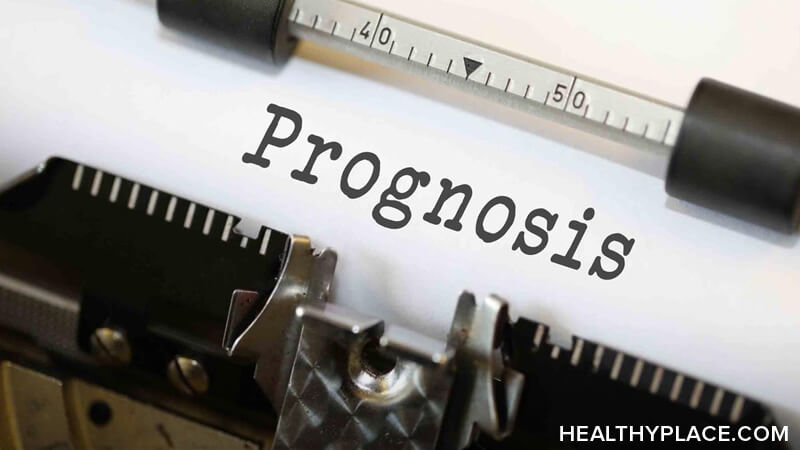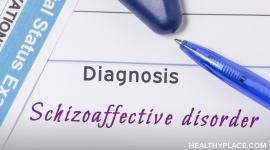Schizoaffective Disorder Prognosis: Will I Ever Get Better?

Prognosis is the expected outcome for someone living with schizoaffective disorder or any other illness. It’s a prediction of how well someone will do over time. If you’re living with schizoaffective disorder, you have a good chance of getting better.
Schizoaffective disorder prognosis is good. People with this psychotic disorder can and often do improve. In fact, a significant portion of people who have been diagnosed with this disorder and are receiving treatment improve. Nearly half of people with schizoaffective disorder are in remission approximately five years after diagnosis and about 25% function well socially for two-year stretches.
Prognosis is determined by comparing the outcome of one disorder to other, similar, disorders. There are other factors at work, too.
Prognosis of Schizoaffective Disorder vs. Other Disorders
Of all the psychotic disorders, schizoaffective disorder has one of the best outcomes. Among people living with other psychotic disorders, including schizophrenia, it is those with schizoaffective disorder that have the highest chance of regaining their previous level of functioning.
Part of the reason for this is that the entire course of schizoaffective disorder is intermediary. It involves periods of remission occurring between periods of symptoms. Schizophrenia, by contrast, isn’t as cyclical and the likelihood is less that someone will have significant periods of remission.
However, when broken down into components, the picture is not so clear. For example, looking at a single aspect of functioning, being able to hold stable employment, people with either schizoaffective disorder or schizophrenia have a less positive predicted outcome than anyone who doesn’t live with these disorders.
The prognosis for schizoaffective disorder is favorable when compared with other psychotic disorders. Because it has components of mood disorders though, it also must be compared to major depressive disorder and bipolar disorder. According to the Diagnostic and Statistical Manual of Mental Disorders (DSM-5), mood disorders have a better prognosis than schizoaffective disorder.
People experience schizoaffective disorder differently. Some have more psychotic symptoms than mood symptoms, while others have mood symptoms that are dominant (Symptoms of Schizoaffective Disorder). Whether mood symptoms or psychotic symptoms are stronger might play an important role in schizoaffective disorder prognosis.
The prognosis for schizoaffective disorder isn’t entirely random. There are factors at work that influence the outcome of this psychotic disorder with mood features.
Factors Which Influence the Prognosis of Schizoaffective Disorder
Like all illnesses, schizoaffective disorder is highly individualized. Within the framework of what makes schizoaffective disorder schizoaffective disorder, each person experiences it uniquely.
The personal nature of the disorder carries into its prognosis, too. Everyone’s outcome can be different. A big part of the reason for that involves specific prognostic factors:
- The way someone functioned before symptoms began
- How intense the symptoms are
- The nature and depth of the psychosis
- Whether psychotic and mood symptoms are congruent (do they cycle together, occurring simultaneously (better prognosis), or are they out of synch, one group beginning as the other group ends?)
- How persistent the symptoms are (how long they last)
- How negatively schizoaffective disorder affects cognitive functioning
- How many episodes does someone experience as time progresses (the total number as well as frequency per year)
While there isn’t a cure for schizoaffective disorder, at least not yet, this illness can go into remission, a period in which symptoms aren’t present and functioning is good. The more the factors can be answered positively, the better the chances are that the signs and symptoms will recede.
People often experience schizoaffective disorder in cycles of symptoms and remission. It’s possible to achieve an outcome in which periods of remission are long and periods of symptoms are relatively mild.
The key for the best possible schizoaffective disorder prognosis is to receive proper treatment and follow the treatment plan created for you. It might seem pointless to have doctor visits and take schizoaffective disorder medication when you’re in remission, but complying with treatment is one of the primary components of a good prognosis.
While there are no guarantees because this complex disorder is different for everyone and so many different factors are involved, if you are living with schizoaffective disorder, the prognosis is good for getting better.
APA Reference
Peterson, T.
(2021, December 29). Schizoaffective Disorder Prognosis: Will I Ever Get Better?, HealthyPlace. Retrieved
on 2025, April 15 from https://www.healthyplace.com/thought-disorders/schizoaffective-disorder-information/schizoaffective-disorder-prognosis-will-i-ever-get-better



